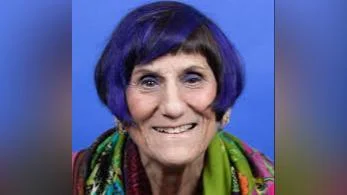Under a banner reading “National Champions,” a celebratory ribbon was cut to commemorate 20 years of local and international anti-human trafficking advocacy and prevention work.
Supporters and staff of the nonprofit Love146 cut that ribbon Wednesday afternoon to dually celebrate the organization’s 20th anniversary and reopening of its headquarters.
Love 146 was established in 2002 as a global child trafficking advocacy and prevention organization.
The organization was previously housed on Chapel Street but closed its doors to in-person meeting when the Covid-19 pandemic started. The staff of social workers, trainers, and specialists shifted their work to remote.
The Wednesday gathering celebrated the reopening at an undisclosed new location in East Rock earlier this year. The off-site ribbon cutting was hosted at Mory’s on York Street to avoid disclosure of the organization’s home base for the safety of the children the organization works with daily.
The New Haven office serves all of Connecticut. Social workers travel throughout the state to meet regularly with youth. The organization’s motto is “We go where you go,” meaning social workers travel to youth in the hospital, in foster care, or if they move out of town.
The team was supported by a new partner, the Greater New Haven Chamber of Commerce (GNHCC), which helped to host the Wednesday gathering and offered its support to the nonprofit’s future efforts.
Love146 CEO and co-founder Rob Morris said the Covid pandemic created “new vulnerabilities” for youth because of the shift to increased use of technology and the lack of adult supervision in young people’s lives.
“The increase of online use for these kids is dangerous because that’s where things like grooming can happen,” said Morris.
Throughout the pandemic the team increased its efforts to educate youth about how to safely interact online.
Morris said there has been a major change in the support for anti-trafficking efforts, particularly since the nonprofit’s start 20 years ago. “Now it’s like a human rights issue of our time, but it wasn’t always like this,” he said. “This room wouldn’t have been full 20 years ago.”
Love146 has served 725 youth in Connecticut alone who are confirmed or suspected victims of child sex trafficking.
Survivor Care Employment & Education Manager Marlena King began working for Love146 a month before the Covid pandemic hit Connecticut.
She had to navigate establishing the nonprofit’s employment and education program for youth going through long-term survivor care. The program offers one-on-one resources to youth looking to get a job and get their high school diploma or attend college.
Students meet with a social worker, employment specialist, and education specialist to create a care plan listing their goals for education and work. King’s team helps the youth to navigate already complex processes like the Free Application for Federal Student Aid (FAFSA) and learn how to create an email and return voicemails.
“These are things people think just come naturally, but they don’t, especially if you have been through some very tough times and never thought you’d get to this point,” King said.
Love146 Chief Programs & Strategy Officer Erin Williamson has worked with the nonprofit since 2014. She spearheaded the formation of the survivor care program and helped to establish the prevention education curriculum.
The nonprofit offers youth-targeted trauma services and education about how to identify trafficking.
Youth in the survivor care program can choose if they want to receive help from the employment & education program. Many choose to receive the support because of the difficulty of navigating job fairs, interviews, and the school system on their own.
Many youth are easily triggered when attempting to join the workforce because of personal questions asked and required disclosures of past work experiences.
She added that the ongoing pandemic has caused an increase in the demand of youth who need survivor care services and those youth are presenting significantly greater mental health needs.
Youth referrals for the nonprofit’s services are received from child welfare workers, law enforcement, schools, parents, and occasionally other youth who know of friends in dangerous situations.
The majority of victims serviced by Love146 are Black and Brown and LGBTQ youth and young girls.
In addition to doing the on-ground work, Williamson said, Love146 is looking to expand its partnerships with the community to spread the work about anti-trafficking advocacy and the causes stemming from systemic discrimination.
Yale financial analyst Gary Onnembo listened to that cry for help at the Wednesday gathering and said the university plans to form a volunteer group for Love146 in the near future and host a holiday fundraiser.
Gary Ciarleglio of the GNHCC told the Love146 team to “ask us to do more.”
The nonprofit said it never closes its care cases as students “age out.”
Love146 began its work 20 years ago in the Philippines then branched out to the United Kingdom and the United States. While the work is similar in other countries, with established safe houses run for the youth, the age of victims can differ, Morris said. In the Philippines, the youngest victim the organization has worked with was a 1‑year-old. The average age for victims in the Asian country is 9 – 10. In the U.S., the youngest identified victims are middle-school age, Morris said.
The nonprofit, with a staff of 80 internationally, said it has reached 70,000 kids globally.
So far 28 states have implemented the nonprofit’s prevention education curriculum, including child care agencies and schools. The curriculum, developed in 2015, is updated every three years and uses data to show changing technological concerns used as methods for trafficking.
Safe homes in the places like the Philippines are tied to farm property to allow youth to gain work skills and have accessible food.
Original source can be found here.


 Alerts Sign-up
Alerts Sign-up